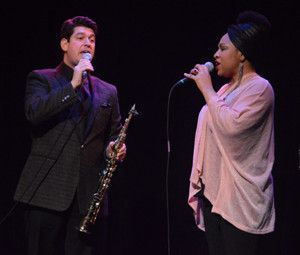
Urban Stages Winter Rhythms
Show Celebrating Famous Duets Is Widely Varied and Entertaining
Described as “An Afternoon of Famous Duets,” Saturday’s Urban Stages Winter Rhythms presentation (Day Four of the 11-day, 20-show festival) was unexpectedly sweeping in its approach, covering duos that sang pop, folk, jazz, Great American Songbook, and musical theater tunes. With veteran cabaret singer Sue Matsuki serving as producer and host, and Musical Director Gregory Toroian on piano (there were also three guest accompanists), the show encompassed both the predictable (Steve Allen’s “This Could Be the Start of Something Big” as popularized by Steve Lawrence/Eydie Gorme, here buoyantly performed by Matsuki and Ed Clark) and the surprising (“The Prayer”–David Foster/Carole Bayer Sager/Alberto Testa/Tony Renis–recorded by Andrea Bocelli & Celine Dion for the animated film Quest for Camelot, and here beautifully rendered by soprano Sarah Rice and tenor Robert Mattern in English and Italian). The show was a genuine pleasure.
Sarah Rice, whom I recall seeing as angelic-voiced “Johanna” in the original production of Stephen Sondheim’s Sweeney Todd, offered (in addition to “The Prayer”) a duet of “Scarborough Fair” universalized by Simon and Garfunkel, with wonderfully hushed vocal by David Vernon (photo right). These two made the song as haunting as it’s ever been, melody wafting into the stilled theater with eloquent restraint.
Rob Langeder and wife Stacie Perlman Langeder sang an energetic “Ain’t No Mountain High Enough” (Ashford & Simpson); Dana Lorge and Warren Schein performed a comic “Quando, Quando, Quando” (Tony Renis/Alberto Testa), during which a frisky moustache changed location; Joan Crowe and Greg Paul (also on guitar) ably sang Phil Collins/Marilyn Martin’s “Separate Lives”; Robert Mattern and real-life partner John Patrick Schutz dueted an evocative “Lily’s Hazel Eyes” (Lucy Simon/Marsha Norman) from The Secret Garden; with Matthew Martin Ward on piano, Carole Demas overacted on Frank Loesser’s “The Ugly Duckling” from Hans Christian Anderson–too bad, she seems to have a nice instrument; Mardie Millit and Daryl Glenn (with Karen Dryer on piano) delivered a rendition of Stephen Sondheim’s “A Little Priest” that was cute where it might have been wry.
Susan Winter was joined by Tom Gamblin (in full drag regalia, left) for a recreation of the Judy Garland/Barbra Streisand duet, “Get Happy” (Harold Arlen/Ted Koehler) and “Happy Days Are here Again” (Milton Ager/Jack Yellen). Both singers have excellent voices. The fine, familiar arrangement was well served with infectious spirit and innate balance that I would encourage them to employ in a full show of any theme.
Mark Aaron James and Ina May Wool (with guitar) performed Stevie Nicks’ “Leather and Lace”-Wool replete with a Nicks-like wig and spot-on inflection; Scott Albertson and Flip Peters (also on guitar) offered “Peaceful Easy Feelin'” (Jack Tempchin) with affectionate folk flavor; Gregory Toroian and wife Renee sang the non-traditional version of “Mockingbird,” emulating James Taylor and Carly Simon; Matsuki and Toroian duoed on “A Fine Romance” (Jerome Kern, Dorothy Fields), during which she was aptly low key, he intent on his own jazz.
A tandem “La Vie en Rose” (Louis Guglielmi-English lyrics by Mack David/Frank Eyton-inspired duet by Tony Bennett & kd Lang) and “A Kiss to Build a Dream On” (Bert Kalmae/Harry Ruby/Oscar Hammerstein, duet by Bing Crosby & Louis Armstrong) was performed by Danny Bacher and Charenee Wade (photo right), a special guest for Bacher’s most recent Metropolitan Room show, Swing That Music. It’s a match made in heaven. From Wade’s satiny, caressing voice (reminiscent of Billie Holiday) to Bacher’s gloriously easy swing replete with soprano sax turn, the two were absolutely elegant.
2015 MetroStar winner Minda Larsen and 2nd runner-up Josephine Sanges (with John Cook on piano) closed the show with Stephen Schwartz’s pop song “There Can Be Miracles” from the Disney film Prince of Egypt. On the recognizable Mariah Carey/Whitney Houston duet, Sanges’ voice emerged warm, aptly restrained, and round-edged, while Larsen’s evidenced superb control, seamless octave changes, and obvious acting ability. Vocal arrangement was just right. The ladies offered the timely sentiment with enthusiasm and skill.